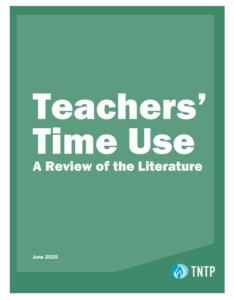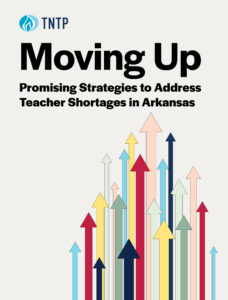Case Study
Creating Equity Through Fair Pay
The Challenge
The Challenge
Retaining Teachers in an Increasingly Competitive Market
In 2018, leaders at Collegiate Academies, a network of charter high schools in New Orleans, became concerned about inequities creeping into their pay structure, and its competitiveness in a tight labor market. Collegiate, named by a local publication in 2016 as one of the city’s best places to work, had long prided itself on providing a vibrant workplace culture and competitive salaries. But as Collegiate entered its 10th year, teaching roles were opening faster than recruiters could fill them.
The charter network had expanded rapidly, growing from one high school with 90 students in 2008 to five high schools and two post-secondary programs in 2018. This growth, along with the network’s 74 percent educator retention rate—higher than that of local charters but lower than the charter national average—meant leaders were in perpetual hiring mode. Individual school leaders had flexibility in the starting salaries they offered, and this opened the door for potential pay disparities, even among teachers with comparable duties and years of experience. In addition, teachers and staff often lacked clarity on how they could earn promotions or higher salaries.
The Collegiate Talent team sought to alleviate some of their yearly hiring burdens by improving teacher retention, which they believed could happen if they formalized their compensation system, demonstrated a commitment to pay equity and transparency, and clarified how educators could grow their careers within the system.
Insight + Courage + Action
Identifying Pay Inequities and Finding Ways to Solve Them
With funding from the federal Teacher and School Leader Incentive Program awarded to New Schools for New Orleans (NSNO), Collegiate partnered with TNTP to conduct an audit and revamp its compensation system. The analysis included a thorough examination of Collegiate’s budget, local market data, and performance evaluations, as well as teacher surveys and focus groups.
Ultimately, the study revealed no statistically significant equity gaps; pay for similar positions was equitable across demographic lines. There were still opportunities to improve the system that Collegiate jumped into action to solve. For example, given the system’s focus on longevity, any difference in tenure across demographic groups had a downstream effect on average pay. With a staff that had rapidly diversified in the years leading up to the equity audit, the average tenure for staff of color was increasing but still remained slightly below that of white staff. Additionally, staff of color tended to hold a higher proportion of lower-paying positions, including paraprofessionals and behavioral interventionists.
A key recommendation to ensure that staff members truly understood their compensation was that the network clarify and make transparent compensation available for each role in the organization, as well as pathways to advancement.
A second finding was that the pay structure favored teachers who had begun their careers at Collegiate, providing sharp increases in years two and three to reflect the significant growth novice teachers are expected to achieve early on. This structure was effective to some extent in attracting new teachers; however, it rendered Collegiate less competitive for experienced educators and career changers.
Lastly, the audit showed inconsistencies in approaches to offering stipends and allocating leadership opportunities across the network. In some cases, leadership roles within schools, such as Grade Level Chair or Department Head, were simply assigned—whereas in other cases, they were determined based on an application process. Similarly, opportunities for extra pay at the network level, such as Network Curriculum Lead, weren’t consistently messaged or opened for all interested and qualified staff to apply.
Together, TNTP and Collegiate created a detailed road map to formalize the pay structure and stipend policies, improve the value proposition for experienced hires, and build more equity into the charter’s overall talent strategy. The recommendations included establishing guidelines to evaluate and credit former non-Collegiate experience; organizing nonteaching roles into salary job bands; creating talent-development programs; conducting regular salary audits; and, fundamentally, documenting their compensation philosophy.
Results
A Recommitment to Diversity and Parity Through a New Pay Structure
TNTP and Collegiate spent a little more than two years evaluating and redesigning the network’s compensation commitments. Simultaneously, Collegiate formalized its holistic compensation philosophy that codified its commitment to valuing workers for both contributions and longevity; ensuring equity; and remaining competitive in the marketplace.
In June 2022, Collegiate Academies announced it would spend $1.5 million to boost base pay across the organization. It raised the annual cost-of-living increase for both teaching and nonteaching staff from 2 to 3 percent and added 5 percent longevity increases for all employees in years 3, 5, 7, and 10.
The new system created standards for evaluating incoming teachers’ previous experience and boosted their base pay accordingly. Now, teachers who enter Collegiate having worked elsewhere receive the 5 percent longevity raises and earn 3 percent increases in years two, four, and six. Novice teachers who begin their careers at Collegiate Academies earn an automatic $3,000 pay bump in their second year and $5,000 in their third year, a reflection of the enormous growth they are expected to achieve early in their teaching careers. During their fourth year at Collegiate, all teachers are eligible to apply to the Distinguished Educator program, allowing them to earn an extra $5,000 each year.
For the 2023–24 teaching year, Collegiate committed another $300,000 toward salaries. With these funds, they raised base salaries for novice teachers, paraprofessionals, and behavioral interventions to among the highest levels in the city. Beyond competitiveness, raising pay for paras and interventionists—roles staffed by primarily Black community members—was essential for both student outcomes and to demonstrate the values of their compensation philosophy. In addition, as part of a commitment to transparency, teachers and staff now receive communication on a regular basis projecting their salaries over the next five years.
Impact
Increased Satisfaction and Retention
The percentage of teachers who felt that their school’s approach to compensation ensured that great teachers got paid well jumped from 40 percent in the fall of 2021 to 52 percent in the fall of 2022—13 points above the city average. In addition, the percentage of teachers who felt they were compensated fairly for the work they did also climbed significantly. The biggest increase came in the transparency category, with almost 60 percent of teachers saying they clearly understood the criteria used to determine pay, up from just 41 percent the year before.
This compensation work is a key piece of our retention efforts. As we continue on our path to increase clarity and build pathways for all staff, I feel confident we are creating a solid foundation to continue improving retention.
—Soraya Verjee, Chief Talent Officer at Collegiate Academies
Staffwide retention is also steadily increasing. Faculty retention climbed by 4 percent between the 2022–23 and 2023–24 school years; overall staff retention rose by 7 percent during that same period. Moreover, teachers at Collegiate were much more likely than those citywide to agree that there are opportunities for them to advance at their schools (64 percent at Collegiate Academies vs. 47 percent citywide). In addition, 61 percent said they were confident that they were earning as much if not more than they could teaching elsewhere, while only 39 percent of teachers at other New Orleans charter schools would say the same.
“Our retention rates are going in the right direction, but we still have more work to do,” says Collegiate Chief Talent Officer Soraya Verjee. “This compensation work is a key piece of our retention efforts. As we continue on our path to increase clarity and build pathways for all staff, I feel confident we are creating a solid foundation to continue improving retention.”
The compensation audit was a key part of Collegiate’s robust talent strategy and commitment to building and maintaining strong adult culture on their campuses and in the organization. At Collegiate Academies, putting students first means creating a culture where team members feel supported, have opportunities to grow, and earn fair salaries. Collegiate leaders have committed to replicating TNTP’s compensation equity analysis on a regular basis to live up to their commitment to pay equity and have pledged to respond swiftly if inequities creep in.
Stay in the Know
Sign up for updates on our latest research, insights, and high-impact work.
"*" indicates required fields
Read Next

Publication |
Teachers’ Time Use
There are many competing demands on teachers’ time. Time spent on instruction benefits both teachers and students. Learn more about how to create environments where teachers thrive in our new literature review.

Blog Post |
Teacher Diversity: A Critical Lever for Student Success
TNTP’s CEO, Dr. Tequilla Brownie, shares why teacher diversity is essential for building a public education system that truly prepares young people to thrive.

Blog Post |
The Talent Before Our Very Eyes: Paving the Way for Future Bilingual Educators
We can overcome a bilingual teacher shortage by recruiting from different fields, improving incentives for teachers to receive training in multilingual education, and reducing barriers to certification.

Blog Post |
Transforming Teacher Preparation with High-Quality Instructional Materials and Research-Based Practices
A community college sees increased enrollment in training programs for new teachers and facilitates social mobility by embedding HQIM in their curricula.

Blog Post |
From Missing Out to Moving Up: Addressing Teacher Shortages in Arkansas
To address teacher shortages, Arkansas began to implement TNTP’s recommendations in 2021. In our latest report, we assess the impact and share next steps.

Publication |
Moving Up
Discover how Arkansas transformed its teacher workforce through initiatives like higher salaries, paid maternity leave, and licensure pathways for aspiring educators.

Imali Ariyarathne, seventh-grade teacher at Langston Hughes Academy, introduces her students to the captivating world of science.
About TNTP
TNTP is the nation’s leading research, policy, and consulting organization dedicated to transforming America’s public education system so that every young person thrives.
Today, we work side-by-side with educators, system leaders, and communities across 39 states and over 6,000 districts nationwide to reach ambitious goals for student success.
Yet the possibilities we imagine push far beyond the walls of school and the education field alone. We are catalyzing a movement across sectors to create multiple pathways for young people to achieve academic, economic, and social mobility.